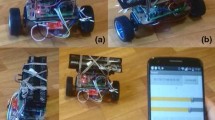Abstract
This paper constructs a stochastic fuzzy controller based on OCPFA learning system to realize self-balancing control of two-wheeled robot. The OCPFA learning system is in fact a Probabilistic Finite Automata (PFA) which based on Skinner Operant Conditioning (Skinner OC). Reorientation mechanism which take for posture balance of orientation function as goal-orientation is designed to make response to the output control variable of fuzzy stochastic controller; Learning mechanism is designed to update probability of output control variable by using the response information from the environment to achieve the anticipant probability vector which can minimize orientation function. The designed stochastic fuzzy controller can choose the optimal control variable by interacting with the dynamic environment. The simulation indicate that the stochastic fuzzy controller successfully applied in two-wheeled robot self-balancing without requiring the model of the robot and the robot can show control behavior of autonomous learning which similar to animal’s OC learning behavior.
Access this chapter
Tax calculation will be finalised at checkout
Purchases are for personal use only
Preview
Unable to display preview. Download preview PDF.
Similar content being viewed by others
References
Clouse, R.L., Kim, S., Waldrom, M.B.: An adaptive threshold learning algo-rithm for classical conditioning. In: Proceedings of the 19th Annual International Conference of the IEEE Engineering in Medicine and Biology Society, vol. 3, pp. 1380–1382 (1997)
Skinner, B.F.: The behavior of organisms. Appleton-Century-Crofts, New York (1938)
Skinner, B.F.: Two types of conditioned reflex and a pseudo type. Journal of General Psychology 12, 66–77 (1935)
Touretzky, D.S., Saksida, L.M.: Skinnerbots. In: The Fourth International Conference on Simulation of Adaptive Behavior, pp. 285–294 (1996)
Saksida, L.M., Touretzky, D.S.: Application of a model of instrumental condi-tioning to mobile robot control. In: Sensor Fusion and Decentralized Control in Autonomous Robotic Systems, vol. 3209, pp. 55–66 (1997)
Touretzky, D.S., Saksida, L.M.: Operant conditioning in Skinnerbots. Adaptive Behavior 5(3/4), 219–247 (1997); Mangasarian, O.L.: Linear and nonlinear separation of patterns by linear programming. Operations Research 13, 444–452 (1965)
Saksida, L.M., Raymond, S.M., Touretzky, D.S.: Shaping robot behavior using principles from instrumental conditioning. Robotics and Autonomous Systems 22(3/4), 231–249 (1998)
Touretzky, D.S., Daw, N.D., Tira-Thompson, E.J.: Combining configural and TD learning on a robot. In: 2nd International Conference on Development and Learning, ICDL, pp. 47–52 (2002)
Tira-Thompson, E.J.: Cognitive primitives for mobile robots. In: AAAI Fall Symposium- Technical Report FS-04-05, pp. 110–111 (2004)
Touretzky, D.S., Tira-Thompson, E.J.: Tekkotsu: A framework for AIBO cognitive robotics. In: The National Conference on Artificial Intelligence, vol. 4, pp. 1741–1742 (2005)
Veloso, M.M.: CMRoboBits: Creating an intelligent AIBO robot. AI Magazine 27, 67–82 (2006)
Tao, R.: Automata introduction. Science Press, Beijing (1996)
Holocombe, W.M.L.: Algebraic. Automata Theory. Cambridge University Press, Cambridge (1982)
Zhu, J.: Fuzzy Control Theory and Applications. Machinery Industry Press, Beijing (1995)
Wang, L.X., Mendel, J.M.: Generating fuzzy rules by learning from examples. IEEE Trans. on System, Man, and Cybernetics 22, 1414–1427 (1992)
Author information
Authors and Affiliations
Editor information
Editors and Affiliations
Rights and permissions
Copyright information
© 2009 Springer-Verlag Berlin Heidelberg
About this paper
Cite this paper
Ruan, Xg., Cai, Jx. (2009). Stochastic Fuzzy Controller Based on OCPFA and Applied on Two-Wheeled Self-balanced Robot. In: Cao, B., Li, TF., Zhang, CY. (eds) Fuzzy Information and Engineering Volume 2. Advances in Intelligent and Soft Computing, vol 62. Springer, Berlin, Heidelberg. https://doi.org/10.1007/978-3-642-03664-4_16
Download citation
DOI: https://doi.org/10.1007/978-3-642-03664-4_16
Publisher Name: Springer, Berlin, Heidelberg
Print ISBN: 978-3-642-03663-7
Online ISBN: 978-3-642-03664-4
eBook Packages: EngineeringEngineering (R0)




